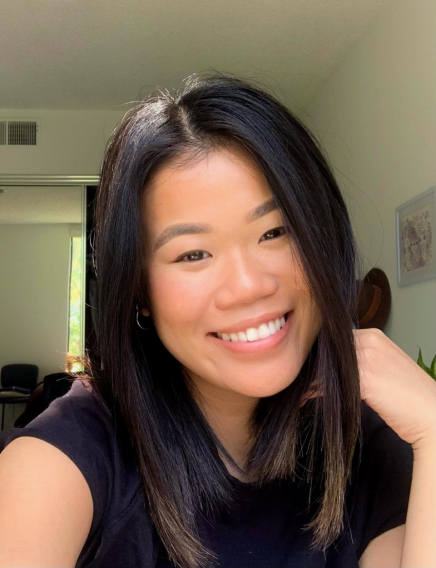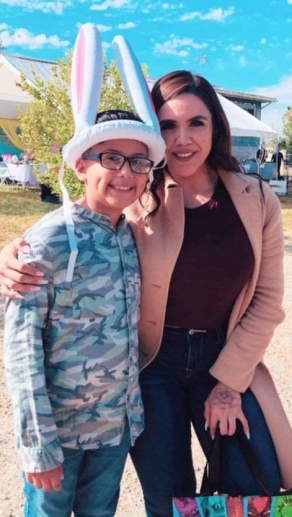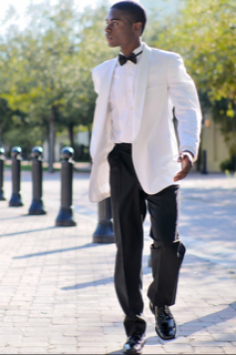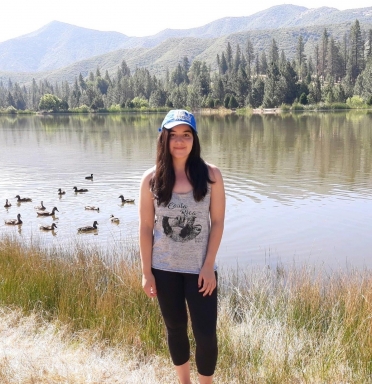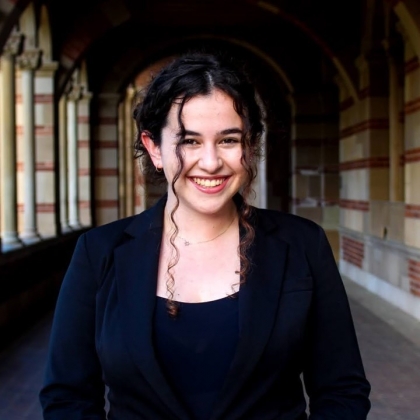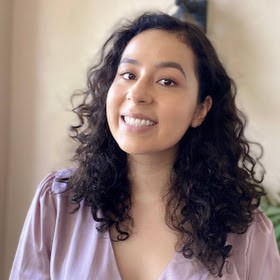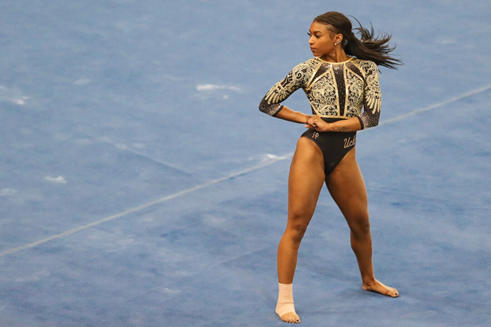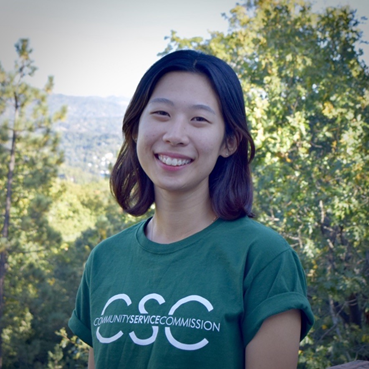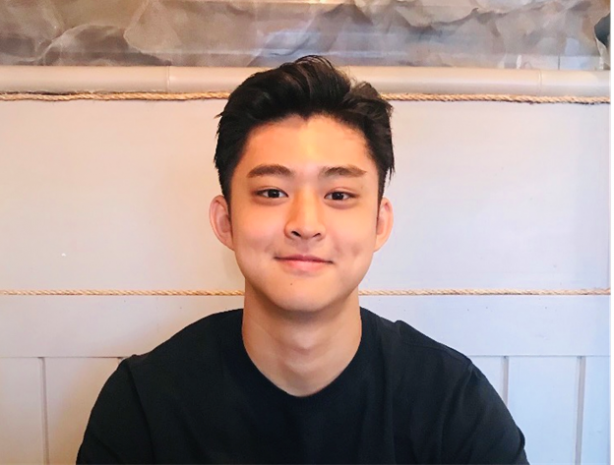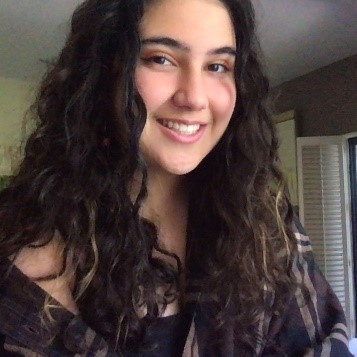Major Of The Month
June Major of the Month (2022)
Liang Qiao
Hometown
Nanjing, Jiangsu Province, China
Hobbies
I love visiting all kinds of museums and seeing different exhibitions. I think it’s a fantastic way to cultivate my taste, learn new things, and simply kill time. Visiting museums also helps me dive deeper into the field of sociology, as the exhibitions oftentimes reflect the artist’s unique understanding of our society. Other than this, I like hunting for food, traveling, and watching movies as well.
What drives your interest in Sociology?
Initially when I started my college life, my interest and major is actually not Sociology, but Economics. However, gradually I realized that economics mostly emphasized theoretical models and the study of market structures. Going deeper, my interest shifted from the specifics of economic models to how these concepts cross from a theoretical basis into the real world, and that’s when I decided to study Sociology and switched my major over. Now, I have to say that studying Sociology is indeed more enjoyable to me as it allows me to understand how things work in a broader picture, and how in many aspects our social structure is strategically constructed to benefit certain groups but oppress others. I also learned the significance of thinking with intersectionality borne in mind and the fact that overlapping social identities or social factors can have multifaceted, complicated effects on a social group or phenomena. I believe learning sociology empowers me to identify and interpret the various problems existing in our society, the essence to take the next step to actually bring changes.
When are you graduating and what are your future career plans?
I’m graduating in June 2022. As a student who also minored in Entrepreneurship at UCLA Anderson, I would like to use my sociological thinking to solve actual social issues through business activities. Therefore, my short-term goal is to work for a consulting or investment banking company where I can leverage my sociological insights to focus on areas like social missions or impact investing. In the long run, I would like to work in an international NGO, such as Asian Infrastructure Investment Bank or World Bank, to intelligently deploy all my previously accumulated professional knowledge and expertise to solve various worldwide developmental issues.
Which Sociology classes have you enjoyed the most and why?
I would definitely say it’s the Sociology of Gender class that I took with Professor Natasha Quadlin. She’s an amazing professor and gives interesting and insightful lectures. Also, I was exposed to many shocking “equity facts” in this class, such as women with higher GPAs faced more job discrimination because they are viewed as “too competent and less likable”. However, men enjoyed a “glass escalator” advantage as opposed to the “glass ceiling” in their career, often with a promotion given or a more leadership role assigned. These facts constantly remind me that fighting for more DEI is a long journey, and I’m always on my way.
Do you have a message for fellow students, faculty, and staff in Sociology?
Oftentimes, the greatest power or utilization is achieved through the combination of theory and practice. I believe the role of sociology is underutilized if it’s only used to understand how society works, and it’s always important for people who are into sociology to think about how to transform taking a sociological perspective from the simple capability to understand things, to the compound capability to solve actual social issues. I also would like to share a sentence in an ancient Chinese poem “问渠哪得清如许 为有源头活水来”, which means “why has the water kept as clear as thus? From its source the springs does come forth alive”. Our society is always changing and evolving, and we should always be humble observers and active hunters for new social insights to stay fresh, stay alive.
May Major of the Month (2022)
Hana Park
Hometown
San Jose, CA
Hobbies
I love traveling and exploring new places via self-guided tours. I also love hiking and used to go hiking almost every weekend near my home in Northern California. At UCLA, I enjoy walking around our beautiful campus, going to the botanical gardens, and walking to Westwood to get boba. I also enjoy reading novels. The most recent book I read was Crying in H-Mart by Michelle Zauner (recommended by TA Alex), and I just started reading Pachinko by Min Jin Lee.
What drives your interest in Sociology?
I am passionate about Sociology because it makes me think, understand, and challenge the social norms that shape our everyday lives. The mundane actions or habits we carry out without much thought and the ingrained perspectives that are never questioned are questioned and challenged when we view ourselves and our surroundings through Sociology. It helps us examine and understand big and small social phenomona but also probes social problems, conflicts, and tensions to help us open our eyes and makes us see the need for social change. Sociology works continuously to help make better societies and individuals. I just love that what we are learning is not confined to text but is alive and breathing and walks with us in our daily lives.
When are you graduating and what are your future career plans?
I am a non-traditional transfer student. I worked as an immigration paralegal for many years before deciding to go back to school for a career change. I am graduating at the end of this quarter and planning on applying to law schools this coming Fall.
Which Sociology classes have you enjoyed the most and why?
I enjoyed taking Professor Quadlin’s M162 Sociology of Gender course the most and highly recommend it to all students. Professor Quadlin gives amazing lectures. They are so fun and enjoyable that you will find yourself looking forward to her next lecture. I guarantee that you will love the class readings. The readings are relevant and applicable to our daily lives. The concepts and theories you learn in class will equip you with the perspectives you need to understand Gender and its related issues. Other Sociology classes that I enjoyed were M125, 101, 102 and 185. I enjoyed taking M125 because I found conversation analysis very interesting to learn about, and I felt honored to learn from Professor Clayman. I enjoyed Professor Ferguson’s 101 because his lectures were beautiful and engaging. Professor Speer gave very thorough lectures in 102 and 185, and he set a firm sociological foundation for me.
Do you have a message for fellow students, faculty, and staff in Sociology?
To fellow students: You all are amazing! As a fellow student, I am inspired everyday by your motivation and hard work. Let’s push through till we move our “tassels to the left.” We got this!
To faculty: Thank you for delivering your amazing lectures. Although we may be one of your many, many students, you are remembered by each one of us as a professor who made a difference. You inspire us. You shift our paradigms. You become our role models. Thank you for being our professors and nurturing our minds.
To staff: I want to thank Simbi and Dreama for their unwavering support and guidance. Despite their busy schedules, they always handle questions and requests with the utmost care and efficiency. Many times, they made me feel like I was their only student. I also want to thank all of the Sociology department’s awesome TAs, who are so dedicated and helpful. I want to thank the TAs for enriching our learning experience with their abundant insight and knowledge.
February Major of the Month (2022)
Hannah Chan
Hometown
Bay Area, specifically Fremont, CA.
On her bookshelf
One of my favorite books is In Defense of Food by Michael Pollan and I am currently reading Crying in H-Mart by Michelle Zauner.
Hobbies
Film photography, painting, and I just started playing tennis.
What drives your interest in Sociology?
There are many things that drive my interest in sociology but what seems to fuel my passion greatly is my mother’s upbringing in San Francisco’s Tenderloin district and her dedication to give back to her community since I child. My mother’s upbringing was foreign to me since my parents worked persistently to provide a childhood for me that would be unrecognizable from theirs. As a child that benefitted from my Chinese immigrant parents’ laborious work and assimilation to American culture, my background has further encouraged me to search for equitable solutions that break the cycle of unequal distribution of resources and socioeconomic class disparities….The appreciation for our stability draws us back to the community in hopes of relieving struggles that my mother once endured [and sparked] my concern and obligation for the disadvantaged.
You are finishing up this Spring. What are your post-grad plans?
I hope to [work] towards a Master’s in social work. The sociological perspectives and theories I have learned and applied to real life scenarios will be beneficial when I shift [to] social work. Armed with a MSW, I will [hope] to become a licensed family social worker and thus becoming an ally and accessible resource to those within the social welfare system. The reason why I chose social work to be my life’s work is due to the growing rates of homelessness and youth in foster care, as well as the decreased resources in communities with high rates of poverty. I believe that solving these issues start with targeting root causes and finding solutions for the various micro issues that contribute to the negligence of the American social welfare system. [As a social worker] I want to help bridge the opportunity gap for foster youth and create modes for building and influencing self-sufficient individuals post-foster care.
What has been some of your favorite Sociology classes at UCLA?
The two sociology classes that I have enjoyed the most are SOC 102: Contemporary Theory with Professor Guhin and SOC 133: Collective Behavior with Professor Walker. Both professors are incredibly inspiring and makes learning an absolute joy. These two classes challenged me to question the status quo, understand why social systems are the way they are, and taught me how to better analyze and challenge social structures in with sociological lenses and perspectives.
January Major of the Month (2022)
Marilyn Martinez
Hometown
Glendale, CA
2022 Goals
Beyond applying to law school this year, I am making a conscious effort to be more active through daily hula-hooping.
What has the sociological perspective given you?
The realization that things did not just come to be, instead they were strategically designed and established gave me a new perspective and understanding of the world. It allowed me to gain more empathy for people who were struggling or having a hard time. Additionally, it allowed me to locate my family and my community within American society and to give them voice. It showed me that even the most mundane of things, such as how many hours of sleep we get, or how long we commute to work can all be the results of the structures that be. The sociological imagination can be applied to phenomenon all around us hence, its application is organic and effortless. It is this application of the material that drives my interest in sociology and equips me to do my part to make this world a better place.
You’re writing an honors thesis in the department. Can you tell us more about how you decided to write a thesis and your experiences in the honors program?
It started with a simple curiosity. I wanted to research garment workers. From there I scheduled a meeting with Dr. Berend and shared my research interests and then decided to further develop my ideas and propose a project. I am exploring how garment workers navigate the vulnerabilities of their position in the informal labor market and the strategies they employ to survive and thrive on the outskirts of the mainstream labor market while facing criminalization and extreme exploitation.
It has been a challenging, yet incredible experience. The program understands that for a lot of us this is the first opportunity to conduct an independent research project. It has been such an immense learning curve, yet it has enriched my sociological understanding. This program has allowed me to take theory and observe its application in everyday life. I am currently finishing up my data collection. It has been the pleasure of my life to interview garment workers in Los Angeles. I find that everyone has such a unique story to tell. Additionally, working independently has challenged my self-discipline. This challenge has been rewarding because it has positively transformed and advanced my studying, reading, and writing skills.
What are your future career plans?
I hope to become a lawyer. As a lawyer, I hope to give back to my community by representing exploited workers, and other disenfranchised members of society. I hope to serve as a vehicle of justice to as many people as I can to ensure that justice is a right, rather than a privilege.
What Sociology classes have you enjoyed the most?
The two sociology classes that I have enjoyed the most are Sociology 185 American Society taught by Dr. Speer and Sociology 133 Collective Behavior taught by Dr. Walker. Both classes challenged me to look beyond my own experiences to better understand the experiences of others. My knowledge and understanding of our society exponentially grew in both classes as I explored the mobilization of various social movements and as I learned about the structural deficiencies found within American Society.
December Major of the Month (2021)
Jannely Gallo & “B”
Pronouns
She/ her/ hers/ ella
Hometown
Huntington Park, CA & Maywood, CA
Hobbies
Reading (currently reading Asperger’s Children: The Origins of Autism in Nazi Vienna), learning Soccer with my child (he is a current soccer player, GO LAGUNA FC!) and TV binge.
How have your challenges in the real world shaped your interest in sociology and your educational journey?
My experience growing up in a Mexican, low-income household with an absent father placed me in a unique position. Neglected a supporting, warm and nurturing childhood, at the age of 11, I began helping my household by becoming my mother’s language broker and my two younger sisters’ caretaker. While my undocumented mother looked for the employment that never came, she resorted to selling tamales, and anything else that she could cook from shopping at dollar stores. I helped sell these from her minivan. Later, my ex-stepfather abandoned us, and bills and rent were overdue. As the oldest, rather than pursuing a higher education, my mother depended on me to take the role of the absent parent (common in many Latine households). Taking this role meant working double shifts and forcibly maturing rapidly to become head of the household as this was our only way to persevere. Now, I understand that encountering these real-world challenges were highly due to the social issues many low-income undocumented families experience.
Understanding that my family and I have been adversely affected by social injustices simply for existing as low-income, undocumented people of color is what drives my interest in sociology. Sociology, so far, has heightened my understanding of how the social world works (clearly, not working for my family and other Latine communities). Therefore, with the skills I have learned taking Sociology, as well as my minors in Disability Studies and Chicanx Studies classes, I want to positively influence my systemically underserved community. I can do this by engendering a safe space for us and also help dismantle inequities faced by historically excluded communities.
How does this combination of knowledge and experience relate to your career goals?
As a single mother of an autistic individual with no help from the other parent, I navigated my child’s Autism diagnosis on my own. This is a life experience I wish no one would have to undergo because I did not receive the support or services I urgently needed early enough, which only deteriorated my overall wellbeing. Unfortunately, disability, as well as mental health is highly pathologized within my Latine community, therefore, I plan to open a community center in my hood for disabled people of color and their families. While working on this, I will also be preparing myself to become a licensed therapist of color, then a Doctora (Dr.). I know achieving the above will enable me to not only provide a much needed safe space for this community where they can access services, but also serve them to reach their full potential by centering on their capabilities rather than disabilities.
What message do you have for fellow students, faculty, and staff in Sociology? Is there something specific you’d like to say to your fellow parents in the major?
For fellow first-generation students: Felicidades, Congratulations! Many times, I know y’all have experienced full-blown impostor syndrome (I still do), but I want to stress that “You belong, you deserve it, you have worked hard for your accomplishments and although not easy, y’all are here taking up space that is meant for y’all!”
For fellow parenting students: Congratulations! Y’all are amazing and should be proud! Your kid/s is going to be so proud of you too! And there is no one way, or one right way, to work through our current life demands, but let’s normalize parent breaks (even if it’s only 15 mins) and destigmatize crying (it is actually cathartic).
For faculty and staff in Sociology: Thank you for all the support y’all have provided, particularly for pulling it together to best serve us students throughout the still existent COVID-19 crisis. Ending on that note, also, please take the time to get to know your students, particularly the ones who do not take up much space. As a first-gen non-traditional parenting Chicana student, in every space I try to enter, I am tasked with navigating ambiguity. My intersectionality goes together with unpredictability, as well as working through barriers that we may not initially be well-equipped to overcome.
What have been some of your favorite classes or professors at UCLA?
Ah! I have many… Disability Studies 101W: Perspectives on Disability Studies with Professor Solone, Psych M139: Perspectives on Autism and Neurodiversity, SOC 180A: Sociology of Race and Ethnicity: Considering University with Dr. Brown, SOC 170: Medical Sociology with Professor Larkins, all the research work I did as a scholar in the Undergraduate Research Scholar Program with my mentor, Dr. Andalon, and of course the internship work I completed this Fall quarter with my GSI Cymone Mack.
November Major of the Month (2021)
René Valius
Hometown
Originally from Miami, Florida, [but] my passion has been experiencing new people, places, and cultures. In addition to my travels worldwide from Israel to South Africa, I’ve also lived in New York, Atlanta, and most recently, Los Angeles to attend UCLA.
What do you do when you’re not studying?
Surfing, Climate Activism (including Climate Reality Leader 2021), Reading, Exploring National Parks, Reselling, Tennis
What drives your interest in Sociology?
I have always lived by the motto that “I am a student of life.” On a micro level, I believe that each personal experience can bring about learning lessons and change at a macro level because these micro experiences tie together to form society. That in and of itself is sociology: how the collective forms from the singular and vice versa; this is where my interest began, but what ultimately made me pursue a major in sociology at UCLA was after I read W. E. B. Du Bois essay, “The Souls of Black Folks.” In his piece, he explores the existence of black “double consciousness. Black “double consciousness” is the internal conflict experienced by oppressed or colonized groups in an oppressive society. This essay motivated me to pursue a degree in sociology and has also been the main focus of my research .Sociology will always be a part of my everyday life, and it continues to help me understand the world around me and be the change I want to see in the world.
What are your future career plans?
While attending UCLA, I have had the pleasure of being a part of the Law Fellows program. Through this program, I was fortunate enough to be able to attend the academies they offer. I’ve heard from incredible speakers and alumni; I’ve sat in on graduate law classes and had the opportunity to meet one on one with my law mentor. Through these experiences, I’ve realized that I am passionate about the law and looking forward to going to law school and becoming a lawyer. I will be studying for the LSAT in the coming months and applying to law schools. I am actively pursuing internships and look forward to all that will bring.
What message do you have for fellow students, faculty, and staff in Sociology?
For fellow students – my advice is to utilize all the resources UCLA has to offer. The reality is we will not like every course we take, but there’s always something important to be learned. Take the classes that make sense to who you are and build upon that.
For faculty and staff – I have greatly appreciated the opportunity to learn from you.
Which Sociology classes have you enjoyed the most?
My favorite courses were SOC 101 and 102. These foundational courses set the tone for everything I learned and ignited my passion for sociology. I loved taking an internship through the course SOC 195 CE and working with Eric Baldwin. This class helped me see just how much sociology does impact the world and your career. I enjoyed classes with Professor Speer, including Sociology of Mass Communications (M176), Soc 110, Soc 185. As far as non-sociology courses go, favorites would be Professor Tananarive Due’s Afrofuturism and Sunken Place courses.
October Major of the Month (2021)
Nicolette Gelnak
Hometown
Woodland Hills, CA
Favorite part of being back on campus
I love the energy that comes with having everyone back on campus together.
Fun Fact
I own an Etsy shop where I sell 3D printed cookie cutters!
What drives your interest in Sociology?
As the daughter of immigrants from two countries that are in constant social and political turmoil, I have heard my fair share of tragic history over the years. I grew up on stories of modern ethnic cleansing efforts in Armenia and government corruption in Russia. Now, I am coming into adulthood in the midst of increasing social unrest in America. Studying sociology will not only enables me to understand the underlying social issues that influence these societal patterns, but gives me the skills I need to act with purpose. Through discussions on topics such as intersectionality, societal norms, inequality, and more, I am gaining a more holistic comprehension of the current state of the world so that I better know how I can improve it. Recent events have only highlighted the vital importance of cultivating a sociological imagination. In Spring 2020, nation-wide protests following the death of George Floyd erupted only weeks after I had learned about how the ways in which police brutality events were framed influenced the outcome of the Rodney King trial in Sociology CM125. I am constantly seeing opportunities to apply the discussions we have in class to the events occurring everyday around me. Sociology is more than a subject to study: it is a method of thinking and a way of seeing the world. It’s an exploration of my social surroundings, a way to start recognizing how and why injustices occur, and a source of the hope that I can make a difference.
What are your future career plans?
After I complete my undergraduate degree, I plan to continue pursuing higher education in law school, during which time I intend to build upon my understanding of society and further enhance my ability to make change. In law school, I hope to learn how to fight for justice in what often seems to be a very unjust world. Studying the law is an opportunity to combine my passion for leadership with my desire to advocate for others on a larger scale. Upon my graduation, I will be armed with the knowledge and credentials necessary to meaningfully address the root causes of societal issues.
Which Sociology classes have you enjoyed the most?
Sociology 173 with Professor Rossman, Sociology CM125 with Professor Clayman, and Sociology 1 with Professor Collett
June Major of the Month (2021)
Chloe Rosenstock
Hometown
I was born and raised in Los Angeles, specifically Rancho Park (which isn’t too far from campus!)
Summer Plans
I am doing the UC Sacramento Public Policy Program and interning for Governor Gavin Newsom’s Office. I am also going to be doing mutual-aid work with Street Watch LA on weekends, and hopefully going to as many museums as I can!
Fun facts about me
I volunteered at a crisis helpline all throughout high school, I’m a geek for good coffee + books, and I celebrated getting vaccinated by going to the Hammer Museum by myself on a weekday.
Roles on Campus
Co-Director of UCLA Sexperts, Programming Assistant Intern for the LGBTQ CRC, Caseworker with the UCLA Mobile Clinic Project UCLA, Internal Affairs Chair for Companion Care (Mobile Clinic’s sister organization), Assistant Commissioner of Student Wellness Commission, a DJ at UCLA Radio (DJ), and a member of Random Voices (UCLA’s all-women a cappella group).
What drives your interest in Sociology?
I am drawn to sociology because I think it makes me a better citizen of the world. Every time I take a sociology class, I feel as though I can take the knowledge outside the classroom. To me, that is the most valuable aspect of education. Sociology as a subject has also made me realize the path I want to take in life: social change. After learning about the micro and macro structures within which we operate, I felt drawn towards reconstructing those structures to create a more equitable and enjoyable future: planting the seeds that I may not see grow. I owe my passion to Sociology.
What are your future career plans?
I plan to go into public policy. I work very closely with the unhoused community through UCLA Mobile Clinic, and I am committed to reimagining what it means to have affordable and equitable access to housing within a city and how to achieve that. I want to pursue a Masters in Public Policy or Social Welfare prior to hopefully attending law school in order to pursue this path!
Which Sociology classes have you enjoyed the most?
Sociology 180: Reproductive Politics and Everyday Life with Professor Gail Kligman. This class had some of the most engaging readings, documentaries, and lessons that I’ve experienced at UCLA. Learning about reproductive politics is incredibly pertinent in my everyday life as a woman, and incredibly useful in implementing an intersectional feminist framework. Learning about reproductive justice, midwifery, sterilization, and the social construction of motherhood all gave me so much insight into the structures that exist around me and what my place is within each of them. I also loved Sociology 101: Development of Sociological Theory with Professor Yeritsian — I loved how we were able to analyze current events through a Marxist to Weberian lens, making past theories applicable to today.
May Major of the Month (2021)
Daniella Cohensedgh
Hometown
Los Angeles, CA
What drives your interest in Sociology?
I am a strong believer that knowledge should relate directly to human life and pave our path toward overcoming problems. Sociology fulfills these purposes in the best imaginable way. People and their social relationships have always fascinated me. Taking my first sociology class in college, I knew that I had found that special discipline that would uniquely captivate me. Sociology was an enticing invitation to delve deeper, examine, discuss, and write about social life. I love how sociology has sharpened my perception and critical thinking. Taking this first class was what drove my interest in Sociology. After taking this course, I began to realize how prominent Sociology is applicable to my everyday life. For example, I have paid more attention to social class and status while working at a high-end sports club, where membership is tied with social values such as health, fitness, beauty, and prestige. Sociology also made me a more critical observer of gender. Women still earn less than men in similar positions, and they have been silent victims of men’s harassment in industries like entertainment. These sociological issues are important to me as a young woman of immigrant background who hopes to attain a better life than my parents through higher education.
My sociology education is the ideal background for the study of law, which I am pursuing to become an attorney. My studies in sociology have helped me develop a better understanding of the social context in which the law governs our lives. For example, sociologists have extensively researched how a person’s race, ethnicity, or socioeconomic status can affect their fortunes in life, for instance increase their odds of being arrested or receiving the death penalty. Sociology has therefore shape me into a more compassionate legal professional who is sensitive to people’s adverse life circumstances and will advocate their interests with great understanding and vigor.
What are your future career plans?
My future career plan is to become a lawyer for those that have been victims of sexual harassment or assault. I am very passionate about advocating for those who have been silenced and through my work in the UC Women’s Leadership Committee at UCLA this past year, I have been able to understand more about how many individuals have experienced sexual assault and need someone to advocate and believe in them. I hope to work in a big law firm and then someday open up my own law firm that focuses on women’s needs to be heard and helped. As a lawyer, I will fight to be a voice for the voiceless. I will fight for people who do not have a family that they can count on. I will be a voice for the women and men who are frozen from shock, pain and disbelief. Most importantly, I will be a voice to those who have been told to stay silent, reminding them that they do not need to stay silent and that they can achieve anything and everything that they set their mind to, regardless of what they may be labeled as. I hope to achieve all of this with my education in law and future as a lawyer. I hope to work with other independent women that hope to make a difference in the world in order to help those who need someone to speak up on their behalf and fight for the justice that they deserve.
Which Sociology classes have you enjoyed the most?
I have enjoyed all of my Sociology courses, yet my favorites have been African American Studies C191: Sociology of Racial and Ethnic Disparities in Health Care, Sociology 191V: Socialization and Life Course, and Sociology 147A: Sociology of Crime.
April Major of the Month (2021)
Sean McMillan
Hometown
San Jose, CA
Is there a fun fact you’d like to share about yourself?
I’ve raised three guide dogs for the blind.
How did you celebrate getting vaccinated?
I hugged my best friend for the first time in a year!
What is one of your goals for 2021?
I plan to start fostering cats and kittens, just as my family did when I was growing up.
What drives your interest in Sociology?
Prior to transferring to UCLA, I helped start one of the first publicly funded LGBTQ+ homeless shelters in the US. During my time working at the shelter, I witnessed the profound disparities my clients faced on a daily basis. In my sociology courses I learned about social structures, institutions, and the many systemic issues that lead to inequality in our society. I saw firsthand how these systemic inequalities affected my clients at the shelter. I decided I wanted to study sociology with the hope of one day working in policy reform to create meaningful policy change that would benefit the health and wellbeing of disadvantaged populations. In my sociology courses at UCLA, I have learned about how social structures such as politics, gender, and medicine operate and impact our daily lives; these insights have allowed me to better understand my own life and the world around me, and I know that I will continue to use these valuable lessons throughout my education and career.
What are your future career plans?
This Fall, I will be starting a Master of Public Health in Health Policy at Yale University. My goal is to become a Healthcare Policy Analyst to analyze and develop legislation and initiatives to improve access to healthcare for underserved populations. Millions of people in the US are not able to access adequate medical care due to issues such as poor healthcare infrastructure and disparities related to race, gender, sexuality, class, disability, and more. I believe each and every person deserves accessible, culturally competent medical care and I want to reform our health systems to ensure that every person can receive the healthcare they need.
What have been some of your favorite Sociology courses at UCLA?
Medical Sociology with Professor Timmermans taught me about health inequities and the flaws in the US healthcare system which will be valuable as I pursue a career in public health. In Sociology of Emotions with Professor Anderson, I learned so much about the ways our emotions impact our lives and social connections. Both the Honors Research Seminar with Professor Berend and my SRP 199 with Professor Saguy have given me with valuable, hands-on research experience which I can apply in my future academic and professional pursuits.
March Major of the Month (2021)
Estefania Villicaña-Albañil
Hometown
Salinas, CA
Do you have a quarantine hobby?
My quarantine pastime is binge watching movies (currently going through the Marvel movies).
What is one of your goals for the new year?
Incorporate more cardio in my workouts.
What drives your interest in Sociology?
Throughout my life, I have been affected by social injustices due to being a woman of color, therefore leading me to pursue a degree in Sociology. With this major, I am understanding other social perspectives and plan to make a positive social change—a change that encourages diversity, so minorities like myself can strive in institutions that weren’t made for people like us. Creating a true diverse community will change society to thrive together with support, inspiration, and acceptance.
What are your future career plans?
Coming from the second least educated town in the nation, I would like to become an Ethnic Studies Teacher at my former high school, North Salinas High School. Since I see my younger self in these students returning to my community as a role model is my goal. As a teacher of color, I will give students of color a better understanding of their roots to be able to navigate through academia. With grit, my students will work hard to defeat the obstacles of being first generation and low income on their journey to obtain education. My journey through education has not been traditional, but my resilience has been fueled by the desire to occupy spaces that my community, past and present, were incapable of occupying due to inequitable opportunities. My interest in becoming a teacher at my former high school stems from that same desire and is followed by the drive to break the patterns of educational and societal oppression.
I want to break the cycle in my community where people don’t go to college due to the fact that they don’t believe in themselves, for it is not common for minorities to go to college. I was trapped within that same cycle until some teachers and coaches saw the potential in me and made me realize what I was capable of. Because of this experience, I help others see and believe that they are worthy through being a TRiO Peer Mentor at my former community college and strive to be a teacher to influence the next generation in our community. Coming from a community that is disadvantaged in every way possible, higher education is the key to changing Salinas for the better. I want students to be able to overcome these obstacles that are holding them back by exposing them to minorities with higher education that they can relate to and starting a program to help prospective first-generation college students at my old high school. Now that I am in higher education, I have come to realize that certain populations are lacking in resources and knowledge about how to pursue a college degree. Returning as a teacher, I will fight the stigma of Salinas being a disadvantaged community, for I believe education will open the doors of opportunities for future generations.
What have been some of your favorite Sociology courses?
Soc 180A: Sociology of Race and Ethnicity, Considering University with Professor Brown and Soc 133: Collective Behavior with Professor Walker
February Major of the Month (2021)
Nia Dennis
Hometown
Columbus, Ohio.
What is your favorite Westwood hangout?
BJ’s.
What are some of your quarantine pastimes?
Quarantine life opened my eyes to truly appreciate nature and take walks.
What are your goals for 2021?
Athletically: I hope to be Pac-12 Champions, Regional Champions, and National Champions in 2021. Academically: I hope to finish my spring quarter with a 3.5 GPA.
Why did you choose Sociology as a major?
I chose Sociology as a major because it really goes in depth about how humans interact and associate with one another throughout society, so I could have a better understanding of how I can make a difference in the world.
What do you want to do after you graduate?
I hope to get into stunt doubling and dancing, but really anything in the entertainment world. Sociology has taught me about social and emotional work with individuals, and I can better approach situations ahead of time.
What have been your favorite Sociology courses?
Some of my favorite sociology classes have been Sociology of Emotions, Sociology of Violence, Culture & Personality, and Sociology of Deviant Behavior.
January Major of the Month (2021)
Angela Li
Where are you from?
Singapore
What is one of your goals for the new year?
Read more poetry and try to memorize some good ones.
Do you have a quarantine hobby?
I borrowed a neighbor’s sewing machine to make some recycled fabric coasters as gifts.
What drives your interest in Sociology?
My interest is driven by the potential to reveal real, unintended impacts of human endeavors on the rest of society. As a sociology and economics double major, I am fascinated by how deep and wide the effects of economic systems and government policies are on the structure and norms of a society. As a Singaporean whose parents grew up in a rapidly changing post-Mao China, I listened to stories of how families adapted to the Communist Party’s sweeping economic policies, or learned about how the Singapore government carefully engineered a coherent national identity out an assembly of different cultural backgrounds.
The potential for the state and economy to shape society often stretches far beyond politician’s imaginations. The narratives being crafted and shared at the top affect who qualifies for help at the bottom. Biases and subconscious frames in the minds of decision-makers inevitably impact how resources are distributed in society and how disadvantaged populations are perceived and supported.
Sociology has been the critical counterbalance to the paradigmatic and theoretical weight of economics, providing me with the analytical tools to understand the profound and systemic impact of capitalist industries and government policies on human life. From studying the Marxist critique of economic theory, to applying neo-institutional theories to globalization and market reform, my study of sociology has provided a crucial understanding of economic systems and their impacts on human society. The potential to bring about positive social change through policy decisions inspires me to learn more.
What are your future career plans?
I hope to inform policymaking that promotes sustainable economic growth. At UCLA, I have taken small but illuminating steps towards my goals as a student leader in the community service sphere. I constantly engage sociological and economic perspectives to assess the value that student organizations bring to the Los Angeles community, and focus on pushing student leaders to think more deeply about the broader issues and circumstances impacting their service community and work. From here, I hope to transition to larger roles where I can inform decisions made by international organizations and governments in their design and implementation of appropriate and sustainable policies to achieve inclusive economic growth.
The challenge of implementing appropriate economic policies is pertinent because many more countries are in the midst of great economic and social transformations, and lessons from the past tell us that we need to consider more than just GDP growth to end up with a truly flourishing society. I am inspired by the collaboration between governments and multilateral organizations to create modern and appropriate solutions to managing economic resources and providing economic empowerment. One example that I find impressive is the work of UNESCO Biosphere Reserves in promoting sustainable management of biologically and culturally unique areas. Designing such comprehensive solutions requires a sophisticated understanding of institutions from a sociological and economic perspective. With further education beyond my undergraduate degree and experience in the field, I see myself taking on such a role and doing a small part to make the world better for all.
What have been some of your favorite Sociology courses?
Environmental Sociology with Prof Bargheer; Self and Society with Prof Collett; Soc 102 with Prof Macias
December Major of the Month (2020)
Grant Cho
Hometown
Los Angeles, CA
Quarantine Pastimes
Hiking, Learning French with my sister
What drives your interest in Sociology?
As the first person in my family to attend college, I made a commitment to myself and my family to work hard to earn my degree in the pursuit of increasing health equity for underserved minority communities. I have personally witnessed the devastating difficulties immigrant families face when trying to access even adequate care, almost losing both of my parents to cancer. I realized that in order to achieve my dream of becoming a healthcare advocate for families like my own, I needed an education focused on critically analyzing the access to and navigation of societal institutions. Sociology provides students like me with a unique and interdisciplinary understanding the relationship between people and systems, power structures and oppression, and addresses the root causes of inequity that persist within our society. I believe that studying Sociology has provided me with the perspective and skill-set necessary to be a more effective community advocate both on and off campus. By practicing public health through a sociological lens, I can contribute to dismantling systemic barriers to care and promote happier and healthier communities.
What are your future career plans?
My ultimate goal is to work on behalf of the California Association of Free and Charitable Clinics and improve access to health resources to underserved communities throughout the state. I plan to pursue an MPH-MHA in order to intensively study hospital administration, management, and policy-based problem solving. With a Sociological background, I can more effectively lead organizations in providing healthcare education and forge new partnerships with existing institutions to help community members overcome barriers to accessing vital healthcare services.
I have strong personal reasons for this career interest. I grew up in a medically-underserved community. Without sufficient high-quality insurance coverage, my parents have never been able to access timely care and are rarely provided access to Korean-speaking doctors and nurses, undermining their treatment. I want to take all of the lessons and insights gained from my family’s own struggles and use them to empower others. I understand the multiple barriers that prevent people like my family from accessing care. For too many Americans, issues such as distance, money, and access to specialists present insurmountable barriers. I plan to devote my life to helping others overcome such difficulties and attain equal treatment and access to resources and decisions.
Which Sociology classes have you enjoyed the most?
My three favorite Sociology classes have been Sociology 170 (Medical Sociology), Sociology 128 (Sociology of Emotions), and Sociology 156 (Race and Ethnicity in America). Medical Sociology details the historical relationship between patients and providers, and the development of health resource deserts for minority communities. The Sociology of Emotions provides critical insight into the journeys of migrants and immigrants escaping difficult lives in their home countries and enduring the unimaginable to support their children in America. Finally, Race and Ethnicity dispels myths about notions of race, and underscores how racialization informs patient experiences in healthcare settings and broader social structures.
Within each of these courses, I was able to recognize and apply classroom concepts to my own family’s journey from South Korea up until my journey in college. For me, these courses have allowed me to engage in insightful and timely discussions and solidified my commitment to establish more accessibility and resources for minority communities in order to promote communities of care and compassion.
November Major of the Month (2020)
Tania Nasrollahi
Hometown
Los Angeles, CA
Quarantine Pastimes
Reading and roller-skating! (Also, trying to find the best ramen in L.A.)
What drives your interest in Sociology?
Sociology has the power to teach us about the social spaces we operate within and interact with every day. Studying social forces that impact society teaches us not only about the collective experiences of people, but it also gives context to our own experiences. My interest in sociological research was inspired by participating in The Community College to Ph.D. Scholars Program, a program for students of minority status seeking to pursue a Ph.D. I spent a year, alongside my cohort, carrying out a research project about stereotypes of Iranian-Americans in the US. I asked participants about stereotypes they had been subjected to and found distinct ethnic stereotypes that fell outside the well-documented Islamophobic stereotypes. Documenting experiences of Iranian-Americans allowed me to put into words what I had tacitly known for so long. At UCLA, as part of the Mellon Mays Undergraduate Fellowship program, I am examining racial and ethnic identity processes. Sociology is easily my greatest passion, and no other discipline has taught me more about our world.
What are your future career plans?
My time working on various research projects through different fellowships has shown me the importance of developing a sociological imagination. This year, I am applying to Ph.D. programs in Sociology. In graduate school I want to examine the process of categorical avoidance across social settings. Categorical avoidance refers to the decision to reject a label or experience to avoid adopting it as an identity. Moving forward, I want to pursue a career as a professor of sociology. Pursuing a career in academia is daunting, but I am certain of my passion for the discipline, and my research interests in identity, ethnic ascription, gender, and race. My time at UCLA has been immensely informative and I feel ready to take on graduate school. In addition to research and teaching, I am especially excited to act as a mentor for incoming students. With the help of our incredible department, I am much more skilled as a researcher than I once was. I want to give back to a new generation of scholars. As an Iranian-American, queer woman, I know firsthand the value of diversity in educational institutions. For students of color, representation and inclusive spaces can change entire educational trajectories. My research interests are heavily inspired by my life circumstances. Universities have a responsibility to achieve equity for all students, and I am eager to support the goal of promoting diversity by giving marginalized people a voice through my research.
Which Sociology classes have you enjoyed the most?
Special Topics in Sociology: Sociology of Race and Ethnicity: Considering University with Dr. Brown, Contemporary Sociological Theory with Dr. Macias, Honors Seminar in Sociology with Dr. Berend, and all my work in 199 contract courses with Dr. Harris!



